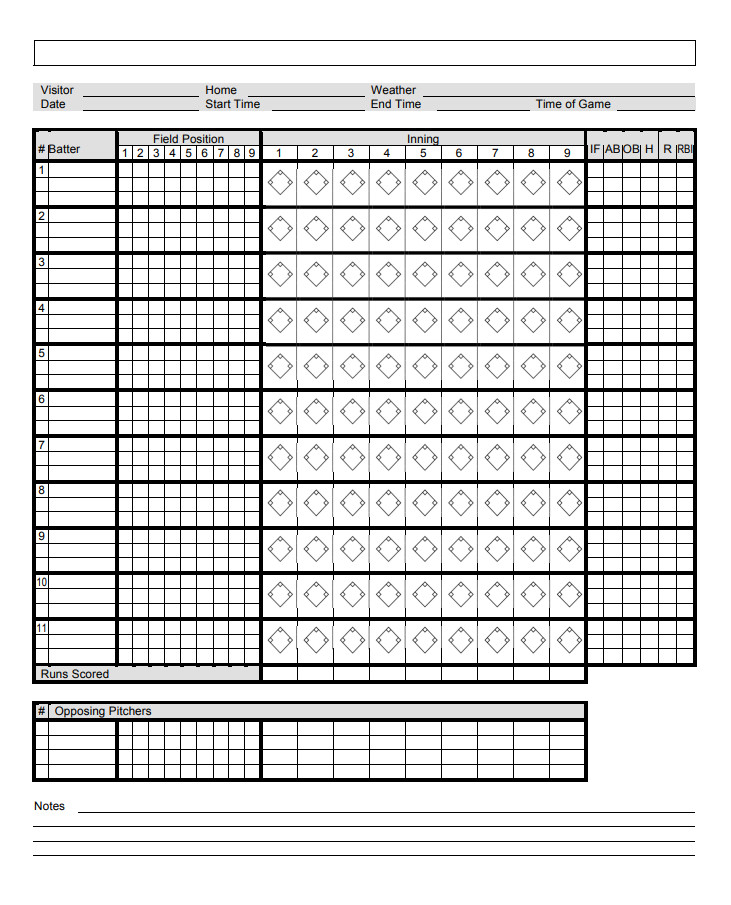
What is a Baseball Scorecard?
A baseball scorecard is a fundamental tool used to document the complete play-by-play action of a game. It provides a structured format for recording essential details such as who is batting, who is pitching, and the outcome of every play.
With its grid layout, scorekeepers can meticulously track each player’s performance, creating a comprehensive historical record of the game.
Why Use a Baseball Scorecard?
The use of baseball scorecards extends beyond mere record-keeping; they serve as invaluable tools for enhancing the overall baseball experience. By meticulously documenting each play and player performance, scorecards enable fans, coaches, and statisticians to delve deeper into the intricacies of the game, uncovering patterns, strengths, and areas for improvement.
Enhancing Fan Engagement
For fans, keeping a scorecard adds an interactive element to watching a baseball game. It allows them to actively participate in tracking the game’s progress, making predictions, and analyzing player performance. Additionally, scorecards serve as mementos of memorable games, preserving cherished moments in baseball history.
Empowering Coaches and Players
Coaches rely on scorecards as valuable tools for analyzing game data, evaluating player performance, and making strategic decisions. By reviewing detailed statistics and play-by-play records, coaches can identify areas for improvement, track player development, and optimize team strategies for success.
Enabling Statistical Analysis
Statisticians play a crucial role in the world of baseball, providing in-depth analysis of player and team performance. Scorecards serve as the foundation for statistical breakdowns, offering a comprehensive dataset for calculating batting averages, earned run averages, on-base percentages, and other key metrics that shape the game.
Promoting Historical Preservation
Baseball scorecards also play a vital role in preserving the rich history of the sport. By meticulously recording game details, scorekeepers contribute to the collective memory of baseball, ensuring that significant moments, records, and achievements are documented for future generations to appreciate and learn from.
How to Keep a Baseball Scorecard
Keeping a baseball scorecard requires attention to detail, focus, and a basic understanding of the game’s rules and scoring conventions. While there are various methods and styles of scorekeeping, the core principles remain consistent across different scorecard formats.
Setting Up Your Scorecard
Before the game begins, prepare your scorecard by filling in the team rosters, including player names, positions, and batting order. Familiarize yourself with the symbols and abbreviations commonly used in scorekeeping to ensure accurate and efficient recording of plays.
Recording Plays and Statistics
As the game progresses, use your scorecard to track each play in real-time. Record the outcome of each at-bat, including hits, runs scored, outs made, and defensive plays. Pay close attention to player substitutions, pitching changes, and other game events that impact the scorecard.
Updating Scores and Totals
Regularly update the scores, totals, and statistics on your scorecard to reflect the evolving status of the game. Double-check your entries for accuracy and completeness, making corrections as needed to ensure an authentic record of the game’s outcome.
Utilizing Advanced Scorekeeping Techniques
For those looking to enhance their scorekeeping skills, advanced techniques and tools are available to provide deeper insights into player and team performance. This may include tracking advanced statistics, creating visual representations of game data, and incorporating color-coding or annotation for additional clarity.
Tips for Successful Scorekeeping
Scorekeeping requires practice, patience, and attention to detail. By following these tips and best practices, you can improve your scorekeeping skills and enhance your overall baseball experience.
Stay Engaged in the Game
One of the most critical aspects of successful scorekeeping is staying engaged in the game. Pay close attention to each play, anticipate player actions, and remain focused on accurately recording the outcome of each play.
Develop a Consistent Scoring System
Establish a consistent scoring system that works for you, whether it involves using traditional symbols and abbreviations or creating your unique shorthand. Consistency in scoring will help you quickly and accurately record plays without confusion.
Double-Check Your Entries
Periodically review your scorecard to ensure the accuracy of your entries. Look for any discrepancies or missing information and make corrections promptly to maintain an authentic record of the game.
Practice Regularly
Like any skill, scorekeeping improves with practice. The more games you score, the more comfortable and proficient you will become at tracking plays, updating statistics, and analyzing game data. Practice regularly to hone your scorekeeping abilities.
Seek Feedback and Guidance
Don’t hesitate to seek feedback from experienced scorekeepers or coaches. Ask for guidance on improving scorekeeping techniques, clarifying scoring rules, or interpreting complex plays. Learning from others can help you expand your knowledge and enhance your scorekeeping skills.
Baseball Scorecard Template
A baseball scorecard is a useful tool for tracking every play, player performance, and game progress in an organized way. It helps coaches, players, and fans record scores, stats, and key moments throughout the game.
To make scorekeeping simple and accurate, use our free baseball scorecard template and keep every inning well-documented!
Baseball Scorecard Template – Download